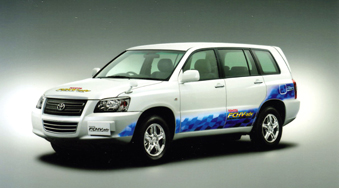Jun. 06, 2008
Toyota Develops Advanced Fuel Cell Hybrid Vehicle
TOYOTA FCHV-adv, with New Toyota FC Stack, Earns Vehicle-type Certification
Tokyo ― TOYOTA MOTOR CORPORATION (TMC) announced today that it has developed a fuel cell hybrid vehicle equipped with the newly designed high-performance Toyota FC Stack. The "TOYOTA FCHV-adv"*1 acquired vehicle-type certification from Japan's Ministry of Land, Infrastructure and Transport (MLIT) on June 3.
During development, TMC analyzed results and data from various utilization studies by the Japan Hydrogen & Fuel Cell Demonstration Project organized by Japan's Ministry of Economy, Trade and Industry, tests conducted by the California Fuel Cell Partnership in the United States and cold-weather tests in Timmins, Canada. TMC also repeatedly carried out basic research to get to the core of technical problems as they arose. Based on the results gained from these studies, the TOYOTA FCHV-adv's fuel cell system was enhanced to further improve cruising distance and low-temperature starts, which had presented obstacles to widespread fuel cell vehicle use.
The building block of the Toyota FC Stack is the Membrane Electrode Assembly (MEA), where engineers focused on the basic problem of internally produced water interfering with electrical generation within the MEA at low temperatures. Fundamental research, such as internal visualization tests, was carried out to understand the behavior and amount of water generated in the fuel cell, allowing engineers to optimize the MEA design to improve low-temperature startup. As a result, the TOYOTA FCHV-adv can start and operate in cold regions at temperatures as low as -30 degrees Celsius, meaning the vehicle can be used in a wider variety of conditions and climates.
In addition, fuel efficiency was improved by 25% through improving fuel cell unit performance, enhancing the regenerative brake system and reducing energy consumed by the auxiliary system. Further changes include incorporating degradation control for the electrode catalyst and improving fuel cell durability. Furthermore, equipping the vehicle with TMC-developed 70Mpa high-pressure hydrogen tanks makes it possible to travel approximately 830km*2 on a single fueling―performance that more than doubles that of the TOYOTA FCHV-adv's predecessor, the TOYOTA FCHV.
While steadily conducting research and development to resolve issues such as how to improve the durability and reduce costs of the Toyota FC Stack, TMC is working with government, energy companies and other concerned parties to actively bring about widespread fuel cell vehicle use.
A Toyota FCHV-adv is to be provided as a test-ride vehicle at the Environmental Showcase within the International Media Center during the July 7-9 Hokkaido Toyako Summit.

TOYOTA FCHV-adv
*1 Fuel cell hybrid vehicle-advanced
*2 10-15 test cycle, TMC calculations
| Vehicle | TOYOTA FCHV-adv | TOYOTA FCHV | |
| Overall length/width/height (mm) | 4,735/1,815/1,685 | 4,735/1,815/1,685 | |
| Weight (kg) | 1,880 | 1,880 | |
| Seating capacity | 5 | 5 | |
| Maximum cruising range (km)* 10-15 test cycle/JC08 test cycle |
Approx. 830/Approx. 760 | Approx. 330/ - | |
| Maximum speed (km/h) | 155 | 155 | |
| Fuel cell | Name | Toyota FC Stack | Toyota FC Stack |
| Type | Polymer electrolyte | Polymer electrolyte | |
| Output (kW) | 90 | 90 | |
| Motor | Type | Permanent magnet | Permanent magnet |
| Maximum output in kW (ps) |
90 (122) | 90 (122) | |
| Maximum torque in N-m (kg-m) |
260 (26.5) | 260 (26.5) | |
| Fuel | Hydrogen | Hydrogen | |
| Storage system | High-pressure storage tanks | High-pressure storage tanks | |
| Maximum storage pressure (MPa) | 70 | 35 | |
| Tank capacity (L) | 156 | 148 | |
| Battery | Nickel-metal hydride | Nickel-metal hydride | |





